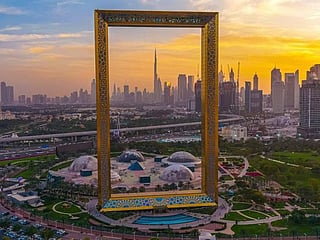This one’s for Julius
The cabbie gets my vote for being the friendliest taxi driver I’ve met so far in Dubai

Somewhere in Dubai is a cab driver named Julius. He hails from Cameroon; “that’s in the very centre of Africa,” he cheerfully told me as he drove me down Al Wasl Road. In the seemingly short 20 minutes that it took him to reach me home, I got to know more about his country than I would have found out if left to my own devices.
Julius has my vote for being the friendliest taxi driver I’ve met so far in Dubai.
And I am certain that his talent is being wasted, seated as he is in front of the steering wheel of a cab. He should either be in the Cameroon tourism department or at the very least in a public relations role.
When I hailed Julius and his taxi, I quite frankly expected that I would find nothing in common with my chauffeur. I was more used to finding a fellow Indian in the driving seat and conversing in Malayalam, perhaps, hearing his tales of trying to make a living.
Jumeirah from Shaikh Zayed Road
However, the icebreaker came in the form of an interchange that led into Jumeirah from Shaikh Zayed Road, and we both found ourselves taking pains to point out that since I needed to go on down to Satwa, Julius just had to take the leftmost lane and follow the signs to Bur Dubai.
It turned out that both of us — as so many others I am sure have done — had made the annoying mistake of driving on straight ending up on Beach Road pointed South rather than North, and then having to go on quite a bit to find a U-turn to get back on track.
The shared ‘pain’ brought out smiles on both sides; we now had a setting for conversation to flow. I opened with: “Where are you from?”
And that’s when the Cameroon bits came out. The country, I was told, had bits of everything that African countries are known for. “Oh yes, you can safari,” Julius told me. Given its location as Julius pointed out, “in the very centre of Africa,” I assumed Cameroon was landlocked. “Oh no,” Julius said, “it has a coastline looking onto the Atlantic.”
“So do you come from the capital city?” I stammered just a bit here, because I somehow felt a bit ignorant not knowing Cameroon’s capital.
“Yaounde?” he exclaimed. “Oh no.”
With a little help from Google Maps
It seems he came from a village very near the city of Bamenda. “Here let me show it to you,” he said as we stopped at a traffic signal. He tapped on Google Maps, but before the page could load the signal turned green. “Let me do it,” I said, fishing out my mobile and tapping in the name. “It’s spelt B A M E N D A ...” said Julius. “You found it?”
Oh yes, I did and Julius beamed.
So Julius landed in Dubai some 6 years ago, travelling from Bamenda — where his parents now stay having left their native village — to Douala Airport. Once again Julius urged me to find Douala on the map and beamed some more when I sportingly did so.
I was fascinated to learn that the people of Cameroon spoke English and French, the two languages that bound the country together. Julius did have his own indigenous tongue, and so did all his countrymen. The only thing is that the dialects are very specific to villages; the only way one village can communicate with the next is in English or French.
My 20-storey apartment building was almost upon us now, and as Julius slowed to a stop, he asked me what I did and more specifically whether I was a teacher. “I am asking because you ask questions just like one,” he said with a slight chuckle.
Well, I wasn’t, I told him, but I do have a background in journalism.
“Ahaan,” went Julius, as though the whole puzzle had just fallen into place.
Maria Elizabeth Kallukaren is a freelance journalist based in Dubai







